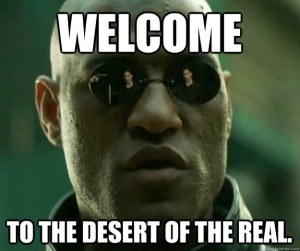Defining “Real”
by Jin Lovelace, HSM team writer & filmmaker
The term “real” is something I’ve seen in recent weeks on Home, and a word that’s tossed around heavily when most would use it as an excuse for certain behavioral patterns they display in the virtual world, whether it’s in an online game or a social MMO.
There was so many ways I wanted to tackle this; the machinima route would’ve been a bit complicated for viewers to interpret, and Mama Lovelace is handling other issues at the moment. She wasn’t something to mess with, as her slaps are that real.
Instead, I wanted to point out an excerpt from a movie scene which is, by far, my favorite trilogy of all-time: The Matrix. Morpheus explains to Neo “the truth” and offers him nothing more but just that: defining real.
Lets focus on what Morpheus stated here. The Matrix is a construct that blinds those who are in it to facts and the reality of the experience. Neo didn’t come to grips to this until he had to make a sacrificial choice: it’s going to either be him or the one who helped open his eyes beyond the codes of the program.
In essence, he sacrificed everything that he believed in, everything he grew up knowing — just to achieve anything he desired.
For those that don’t “get it” yet, I implore that you keep reading on; it becomes clearer.
PlayStation Home is, whether you wish to believe it or not, very much like the Matrix. It is a construct that oftentimes blinds us from the truth, as we deeply immerse ourselves into a world where anything is possible and — perhaps — safe. We tend to bend our characters — ourselves, really — to achieve such desires, and dismiss moral ethics (trolling), notoriety behavior, just to name a couple that are the common memes associated with Home and online gaming in general.
The term “real” has always been bandied about as an excuse for recurrent poor behavior. Specifically, that since Home isn’t “real,” basic standards of decency don’t apply. For instance, it’s ordinary to view the average woman that logs into Home and enjoy the festivities this application has to offer. If we break this down a bit, there are several subsets of the gender that walk-around, ranging from married to lesbians.
This may get touchy here, so stay focus and note this next movie clip.
The two subsets aforementioned are some of the recent (and pretty much in general) I’ve dealt with in terms of social interaction in Home. The women whom I’ve known that are married have, for the most part, the typical profound respect for their partners — while a few I know truly don’t see their own actions. One found it safe to express her bi-curiosity in Home with another female partner, regardless of the fact that she was married to a handsome man and bore three beautiful children. It was told that if her family and husband were to find out about her virtual rendezvous, it would result in internal devastation. However, she also stated something that stuck with me for three years since this incident happened:
“Even though I can understand if he would be angry with me, PlayStation Home is a game; it’ll be trivial for him to be so.”
After trying to reason with her, she insists upon her selfish antics. Three weeks later from that conversation, she lost her husband, her family, and the person whom she would meet with to tell her how much she loved her. Last I checked, she is now a single mother who is struggling to even see her kids.
All of this over a “game.”
Would you believe me if I were to tell you that this is a common thing in Home today? To see married men and women express their carnal desires to others with a belief in little to no consequences?
Imagine, just for a moment, that you were called to account for your supposedly anonymous online behavior. How would you be judged?
Let me be clear: I love everyone regardless of their sexual preferences, gender, or creed. You want to join the epidemic of lonely men looking for attention by cross-dressing as women pretending to be lesbians, thus shooting Home’s “lesbian” population up to a greater number than the isle of Lesbos itself? Fine. The subject at hand is the issue of standards.
Another scenario: a good friend who happens to actually be a lesbian. She’s as sweet as anyone can be, but if any male happens to even say “Hello” to her, she’s quick to dismiss him due to being a pervert (or “perv”). She’s just had too much experience receiving unwanted attention, as did I, but she went full-force on the guy when he inquired upon the confusion that happened.
But what was funny to me was when a random woman happened to walk up to her, greet her, and exchange a couple of words before this statement entered the chat log:
 What transpired afterwards was a series of sexual remarks that the average woman (and man) would likely not express in public. This double standard here was an issue with me, as she went on to generalize all – not most or some, but all — other people indulging in such behavior as pervs, while excusing her behavior in Home as being a game.
What transpired afterwards was a series of sexual remarks that the average woman (and man) would likely not express in public. This double standard here was an issue with me, as she went on to generalize all – not most or some, but all — other people indulging in such behavior as pervs, while excusing her behavior in Home as being a game.
What you do matters. Your actions bear consequences and reactions. What you say in that chat bubble will immediately reflect upon your character. Regardless whether you’re a man using a female avatar or vice versa, your actions and personality are the biggest outcome and leaves a lasting impression upon others, much like real life.
How you dress also determines who you are. You don’t desire to take Home serious, that’s fine because no one is knocking you for it, but show some respect for those who do enjoy the construct. It is a sad truth that the single biggest drawback to Home is its own user base. Not everyone, obviously, but then it doesn’t take everyone, does it; it only takes a handful, with little to no consequence or punishment, who can break the immersion and ruin the experience.
You make Home how you desire it to be. Period. You’re the one that’s bending the reality, and it’s how we, as users, reach out to influence others. That legacy, even via a digital medium, is quite real.
Share
| Tweet |





 Twitter
Twitter